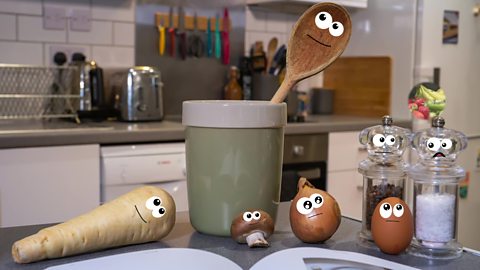Why do we all eat different food?
All human beings are unique and we all eat and drink different things.
- In the world today, we have a huge variety of food and drinks to choose from.
- What we eat and drink is known as our diet.
- Diets can vary because of how our bodies work, our religion or our cultural choices.
In this article you can learn:
- why we all eat different food
- about different food allergies
- what a food intolerance is
- how religious beliefs affect food choices
- how culture can affect food choices
This resource is suitable for Health and Wellbeing for primary school learners.
Video - Food choices and needs
In this video, we visit the supermarket to find out how different things can affect our food choices and needs, such as allergies, intolerances, religious beliefs and culture.
Find out why we all eat different diets.
DAIRY MILK Hello Bread. Welcome to the basket.
UNKNOWN VOICE Hi there!
DAIRY MILK How did you do that?
BREAD Do what?
DAIRY MILK Speak without moving your mouth?
BREAD That wasn’t me.
GLUTEN FREE BREAD It was me! Hello!
DAIRY MILK Argh! What’s going on!?
BREAD Hello!
DAIRY MILK There are two of you!
GLUTEN FREE BREAD We’re cousins!
DAIRY MILK Cousins?
BREAD We’re the same but I’ve got gluten in me…
GLUTEN FREE BREAD …and I’m gluten free!
DAIRY MILK Eh?
GLUTEN FREE BREAD Gluten is a protein found in wheat and other grains. Some humans can’t digest the gluten in bread. Not all human bodies are the same and this can affect the food that they are able to eat.
PEANUTS Like me. Some people can’t eat peanuts because they are allergic to me and I will make them ill.
GLUTEN FREE BREAD Luckily, it is possible to make different versions of foods. So I am Bread but without the gluten!
BREAD Other than that, we are the same - best…
GLUTEN FREE BREAD …friends! We can even finish each other’s…
BREAD …s˛ą˛Ô»ĺ·Éľ±ł¦łó±đ˛ő!
GLUTEN FREE BREAD No.
BREAD Sentences!
GLUTEN FREE BREAD That's better.
DAIRY MILK I never knew people had to eat different things.
MEAT 1 Sometimes it’s because of their body. Sometimes it’s because of religion or beliefs. See over there in that basket? That’s my cousin. I'm Beef, that’s Halal Beef.
DAIRY MILK Oh, hello! I hope I don’t sound rude, but what does Halal mean?
MEAT 2 I’m Halal Beef because I’ve been prepared according to guidelines in the Qu’ran, the sacred text of Islam. That means that Muslims are allowed to eat me.
Other religions have rules about what people can and can’t eat too. Jewish people have rules about what foods are Kosher. If it’s Kosher, it is fit for them to eat.
BREAD What about you Milk? Are there different milks for different people?
DAIRY MILK Oh, I don’t know. I don’t think so.
GLUTEN FREE BREAD What about them?
OAT MILK Helloooo, pal!
GLUTEN FREE BREAD Are you Milk?
OAT MILK Yes. I’m Oat Milk.
DAIRY MILK Oat Milk?!
OAT MILK Yes. I’m off to help out a family who can’t drink dairy products! I’m made of oats! Or you can get milk made from soya beans, almonds, coconuts.
PEANUTS Milk made from nuts?
OAT MILK Yep. People who can’t digest dairy or who choose not to eat animal products can pour me over their cereal instead.
PEANUTS Nuts?!
BREAD It doesn’t matter what we are made of, we are all brilliant and helpful in our own way.
PEANUTS How do you milk a nut?
OAT MILK You soak nuts, grind them up and drain them.
EVERYONE Aaah!
PEANUTS I wish I hadn’t asked.
What is a food allergy?
- Some people have food allergies.
- Our immune system defends our bodies from bacteria and viruses. It tries to stop us from getting really unwell and helps us get better if we become ill.
- A food allergy is when our immune system reacts badly to a particular food. These can be dangerous and make people unwell.
- Allergies are very common and people can be allergic to a whole range of different things.
- The most common food allergies are dairy milk, nuts, eggs, fish (especially shellfish) and gluten.
- People with food allergies must completely avoid these foods to keep feeling well. However, there are many other options if you have to avoid some foods.
Milk allergy
- Being allergic to milk is quite common.
- Many products we eat are made from dairy milk, like cheese, butter or ice-cream.
- There are lots of dairy-free options for people who can't eat them.
- Some examples include milk made from different plants such as: soy, oats, coconuts, rice and almonds.
Gluten allergy
- Many people have an allergy to gluten.
- Gluten is a protein which can be found in lots of our everyday foods.
- It is found in food products made from grains, such as bread, biscuits and pasta.
- There are many gluten-free versions of foods for people who cannot eat it.
Common allergies
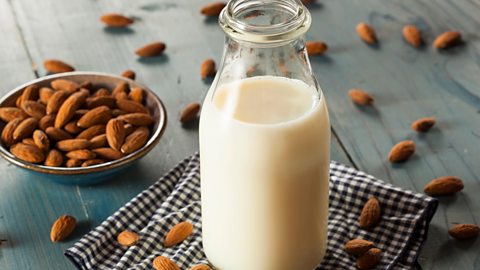
Image caption, Milk
People who cannot drink dairy milk can drink plant-based milk instead. For example, we can make milk from almonds. (Brent Hofacker / Alamy Stock Photo)
Image caption, Gluten
People who are allergic to gluten may eat gluten-free versions of foods, like bread and pasta. (Stephen Barnes / Food and Drink / Alamy Stock Photo)
Image caption, Peanuts
People with a peanut allergy must avoid eating peanuts. Even touching peanuts can bring on an allergic reaction for some people. (Alamy Stock Photo)
Image caption, Eggs
People with an egg allergy have to check ingredients lists carefully because egg can be found in many food products, like cake or pasta. (Kevin Britland / Alamy Stock Photo)
Image caption, Fish
Many people are allergic to fish - particularly shellfish such as prawns and mussels. (The Picture Pantry / Alamy Stock Photo)
1 of 5
What is a food intolerance?
- A food intolerance is different from a food allergyWhen your immune system takes an extreme reaction to food..
- Food intolerances are less serious and won't cause life threatening symptoms.
- They can affect digestionA process in the body where food is broken down so that its nutrients and energy can be absorbed. and cause uncomfortable symptoms like headaches or a bloating stomach.
What is coeliac disease?
People with Sorry, something went wrongCheck your connection, refresh the page and try again. must be very careful not to eat gluten. Even a tiny amount of gluten can damage their digestive system.
It is very important that the food they eat isn't contaminated with gluten when it is processed, cooked or served.
How religious beliefs affect food choices
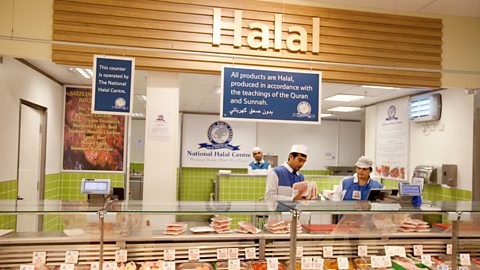
People who follow a religion usually have a specific set of beliefs. Some of those beliefs might change the type of food they eat. For example:
- Kosher is a set of rules about how to prepare and eat food following Jewish teachings. Meat has to be prepared in particular ways and dairy and meat products have to be kept completely separate.
- Halal is the name given to foods that are allowed according to Islam. Some foods need to be prepared and eaten in a certain way following Islamic teachings.
- Many Hindus avoid eating beef as part of their beliefs.

Other dietary needs
Along with a health requirements or a religious belief, we may also choose to follow a certain diet for other reasons.
Many people choose to follow a specific diet for a whole range of reasons, including protecting the environment and animal welfare.
Common examples include:
- Vegetarians do not eat any meat.
- Vegans do not eat meat or any food product that has come from an animal, like cheese and milk.
- Pescatarians eat fish but do not eat meat.
Test your knowledge
Try this quiz to test your knowledge of dietary needs.
Challenge
- The next time you are in the supermarket, look out for sections that offer choices for different diets. Can you find the gluten-freeFood products that do not contain a type of protein called gluten. section or veganA diet that does not contain meat or any food product that has come from an animal, like cheese and milk. options?
- Using the internet with the help of an adult, research where to buy halalFoods that are allowed according to Islam. Some foods need to be prepared and eaten in a certain way following Islamic teachings. or kosherA set of rules about how to prepare and eat food following Jewish teachings. food in your local area.
More on Food and health
Find out more by working through a topic
- count5 of 10
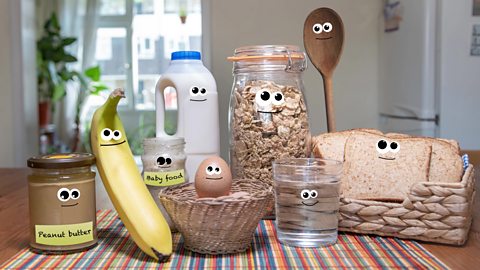
- count6 of 10
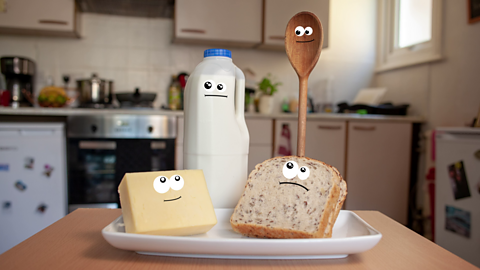
- count7 of 10
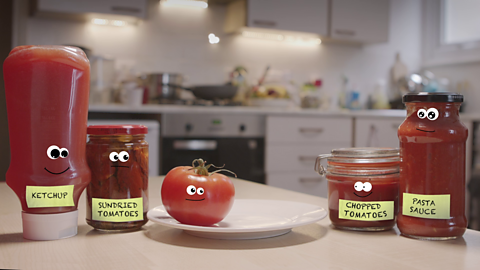
- count8 of 10
